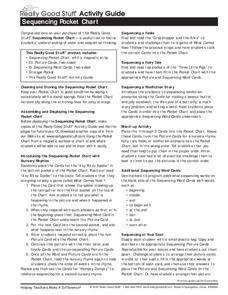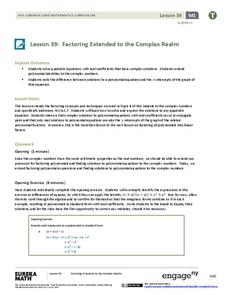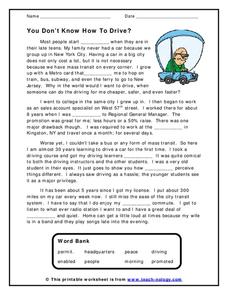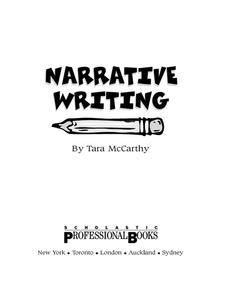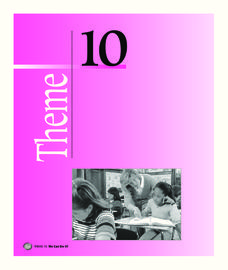EngageNY
Revising the Newspaper Article: Sentence Structure and Transitions
Take two. After a mini lesson covering sentence structure and transition words, scholars revise their End of Unit 3 Assessment based on feedback. Writers self-score their assessments against row three in the Newspaper Article Rubric.
EngageNY
Our Group Readers Theater: Managing the Sequence of Events in Our Script
Go with the flow. Scholars learn how using transition words and phrases helps their scripts flow smoothly. Readers think about connecting each section after determining the sequence for their readers' theater manuscripts from To Kill A...
EngageNY
Storyboard Revision: Managing the Sequence of Events and Using Sensory Details
Mastering techniques from the resource, pupils give life to their writing, revising their storyboards to include sensory details and transitions. To finish, they participate in a peer critique process and use the feedback to further...
EngageNY
Revising the Informative Consumer Guide: Sentence Structure, Transitions, and Works Cited
Transitions are the glue that link paragraphs together. Pupils listen to a mini lesson plan on sentence structure and transitions and use what they learned to revise their informative consumer guides. Next, they self-assess their writing...
EngageNY
Revising for Organization: Timely Transitions
During the eighth lesson in a historical fiction unit, pupils practice thoughtfully transitioning their ideas sequentially. After the teacher models how to add these transitions using the Wheelwright draft created in a previous lesson,...
Scholastic
Active Beginnings
Help your pupils build narratives and stories that capture the attention of their readers with this set of worksheets. The first focuses on active introductory sentences, the second on exciting transition words and phrases, and the third...
EngageNY
Grade 9 ELA Module 3, Unit 3, Lesson 4
The fourth activity in a unit on crafting a research paper focuses on cohesion within and between paragraphs. Class members examine models that lack cohesion and ones that are cohesive and logically developed before using what they have...
EngageNY
Grade 11 ELA Module 2: Unit 1, Lesson 13
Some words leave a lasting impact. After reading paragraph 11 of the text "Of Our Spiritual Strivings," scholars closely examine how Du Bois describes the impact prejudice left on the African American community. They discuss the...
MENSA Education & Research Foundation
The Writer’s Toolbox: What You Need to Master the Craft
Strengthen your high schoolers' writing with a series of steps for writing successfully. With sections on organizing an essay, choosing a topic, crafting a thesis statement, and revising a draft, the lesson encourages your class to...
Really Good Stuff
Sequencing Pocket Chart
Cut it out! Beginning readers practice sequencing skills at home or at school with a variety of activities that require cutting out multiple sets of picture cards and putting them in the correct order.
EngageNY
Factoring Extended to the Complex Realm
A solution will work one way or another: find solutions, or use solutions to find the function. Learners use polynomial identities to factor polynomials with complex solutions. They then use solutions and the Zero Product Property to...
Teach-nology
You Don’t Know How to Drive?
A cloze reading passage about getting a driver's permit at an older age prompts kids to use context clues as they read. They can use the word bank below to fill in eight blank spaces throughout the story.
Ware County Schools
Simple Directions
When teaching someone how to do something, it's important to give clear directions. Your youngsters can practice their skills by completing these worksheets meant to help learners describe the steps in a process. It's not just any...
EngageNY
Grade 11 ELA Module 1: Unit 2, Lesson 12
How does Shakespeare develop the main ideas in Hamlet? Using the resource, scholars continue analyzing the famous monologue from the play. They identify a central idea from the passage and write to explain how it relates to other central...
K12 Reader
Conjunctions: Or
Flower or tree? Rabbit or goat? Hamburger or hot dog? Young grammarians practice connecting nouns with conjunctions in a worksheet that focuses on using the word or.
Starfall
Making a Candy House
In this writing worksheet, scholars use a word bank that includes naming, connecting, and describing words to write about how they would build a candy house.
Scholastic
Narrative Writing
If you're looking to start a unit based around narrative writing, make sure to consider this resource while you're planning. This book covers five topics: writing personal narratives, writing narratives about others, writing...
Education Development Center
Thinking Things Through Thoroughly
Problem solving is a skill of its own. Learners use a variety of problems to encourage mental math and logic to get the correct answer. Guiding questions are provided along the way to encourage the right way of thinking to help tackle...
EngageNY
Proof of the Pythagorean Theorem
What does similarity have to do with the Pythagorean Theorem? The activity steps through the proof of the Pythagorean Theorem by using similar triangles. Next, the teacher leads a discussion of the proof and follows it by an animated...
Curated OER
Ordinary People: Desktop Teaching
Turn the pupil into the teacher to help your learners pick up and retain vocabulary from Ordinary People by Judith Guest. Each individual selects a word, studies it in depth, and then teaches their word to the rest of the class, one...
K5 Learning
Dessert Time!
First do this and then do that. Next do this and after do that. Young readers read about the order each person in the story gets dessert, before answering the who, the what, and the how in the reading passage.
Houghton Mifflin Harcourt
We Can Do It!: English Language Development Lessons (Theme 10)
English language development lessons are brought to you in poems, picture cards, and grand discussions in a We Can Do It! themed unit. Topics of discussion include daily challenges, parts of a whole, words that describe what we...
EngageNY
From Circle-ometry to Trigonometry
Can you use triangles to create a circle? Learners develop the unit circle using right triangle trigonometry. They then use the unit circle to evaluate common sine and cosine values.
Illustrative Mathematics
Margie Buys Apples
One of the most common, everyday applications of math is dealing with money. This single problem calculating how much change Margie receives is more involved than it appears at first glance. An understanding of how fractions and decimals...









